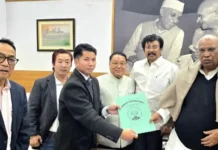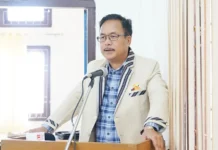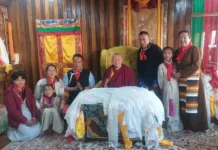[ Dr Devansh Yadav ]
In January 2021, the ‘Nasha Mukt Bharat’ campaign was started by the government of India, and Changlang was one of the selected districts in Arunachal Pradesh. The first wave of Covid-19 had subsided and we were to launch the campaign immediately in the district. In the next four months, we successfully executed a ‘basti-/village-based model’ in Changlang, through which the district administration along with women SHGs and panchayat and public leaders achieved 100 percent drug-free status in the targeted village, ie, Kengkhu.
The TCL (Tirap, Changlang and Longding) region has been most severely affected by opium and other hard drugs. The Singphos in the northern region of the district were encouraged by the British to consume opium, and it was used to subjugate them. Many Tangsa areas were transit trade routes through which Myanmarese traders took back salt in exchange for opium. All this resulted in a significant male population becoming addicted to opium in these areas. With improvement of connectivity, other synthetic drugs like brown sugar have made inroads.
When I was the ADC in Bordumsa region, many de-addiction camps were organized with limited success in the Singpho bastis. One of the primary issues was that 4-5 youths of a village, once treated, started consuming again after going back to the village. There were two primary reasons for this: absence of any livelihood opportunity, and peer groups still consuming.
So this time, when the ‘Nasha Mukt Bharat’ campaign was launched, we decided to focus on only one village at a time. This time I was approached by the Kengkhu self-help group, led by Bihun Taidong. She had been unsuccessfully trying to minimize opium consumption in the village for the past few years.
Kengkhu is one of the largest villages/bastis of the Longchang sub-tribe (Tangsa) and also the earliest opium-affected village in the area. Approximately, 70-80 percent of the youths of the village used to consume some or the other banned narcotics. So, practically speaking, if we could make Kengkhu drug-free, it could be replicated in any other basti. Hence, we selected Kengkhu as our first village under the ‘Nasha Mukt Bharat’ campaign.
We started by assigning a young APCS officer, Metung Taku, to monitor the village 24/7. Village level meeting was done, after which it was unanimously agreed to send willing youths to the drug de-addiction centre in Bordumsa. Women SHGs cited non-cooperation from gram panchayat members and public leaders. Bihun and her group faced harassment from addicts who were angry at these new activities. We could have taken legal action but did not as public opinion was still not in our favour. In two months, 30 youths got completely de-addicted and a few more were accommodated in the newly established de-addiction centre in the district hospital. De-addiction activities involved medical treatment, yoga and morning/evening fitness sessions by the police, and various recreational activities.
In the second meeting, we highlighted what was achieved in the past two months and urged the 30 de-addicted youths to change the sentiment in the village. Coming back from the de-addiction centre, they were healthier and full of energy. We channeled their energy in the newly started cluster farming in Kengkhu and they were motivated by ‘art of living’ sessions by Amaka Ngemu. Through feedback from Bihun, we found out that a few peddlers were supplying drugs incessantly, and so we got them arrested through immediate police action. This suddenly reduced supply of drugs in the village.
Meanwhile, Covid-19 cases were rising rapidly in the district and we had to shift the district hospital de-addiction centre to Kengkhu basti. After five days, to our utter shock, we found out that all the youths had left the de-addiction centre in Kengkhu village, citing lack of amenities. It was a real low moment in the whole initiative.
We called an urgent meeting of the ZPM and gram panchayat and community leaders. They were told that, without their cooperation, the effort of the past two months would go to waste. ZPM Mengpa Haisa and community leader Happa Taidong took the responsibility and, through community contribution, restarted the de-addiction centre with all basic amenities.
On 28 May, 2021, Kengkhu suffered the wrath of Covid-19 and the entire village was declared as a containment zone. Despite all the hardships, the entire village was by now determined to eliminate drugs 100 percent.
In the current ongoing de-addiction camp, 17 remaining youths have been treated of opium addiction and will be released soon to lead a normal life. They will be working in cluster farming, using the latest agricultural technologies. On 13 June, 2021, a small event was organized, in which Kengkhu was declared a ‘drug-free basti’.
The gaon burah, panchayat members and public leaders have pledged to ensure that it remains drug-free in the times to come. Amidst all the gloom of Covid-19 and numerous failed initiatives to combat the drug menace, the ‘Kengkhu basti model’ is a ray of hope to make Arunachal a drug addiction-free society. (Dr Yadav is an IAS officer and is currently posted as Deputy Commissioner, Changlang)



